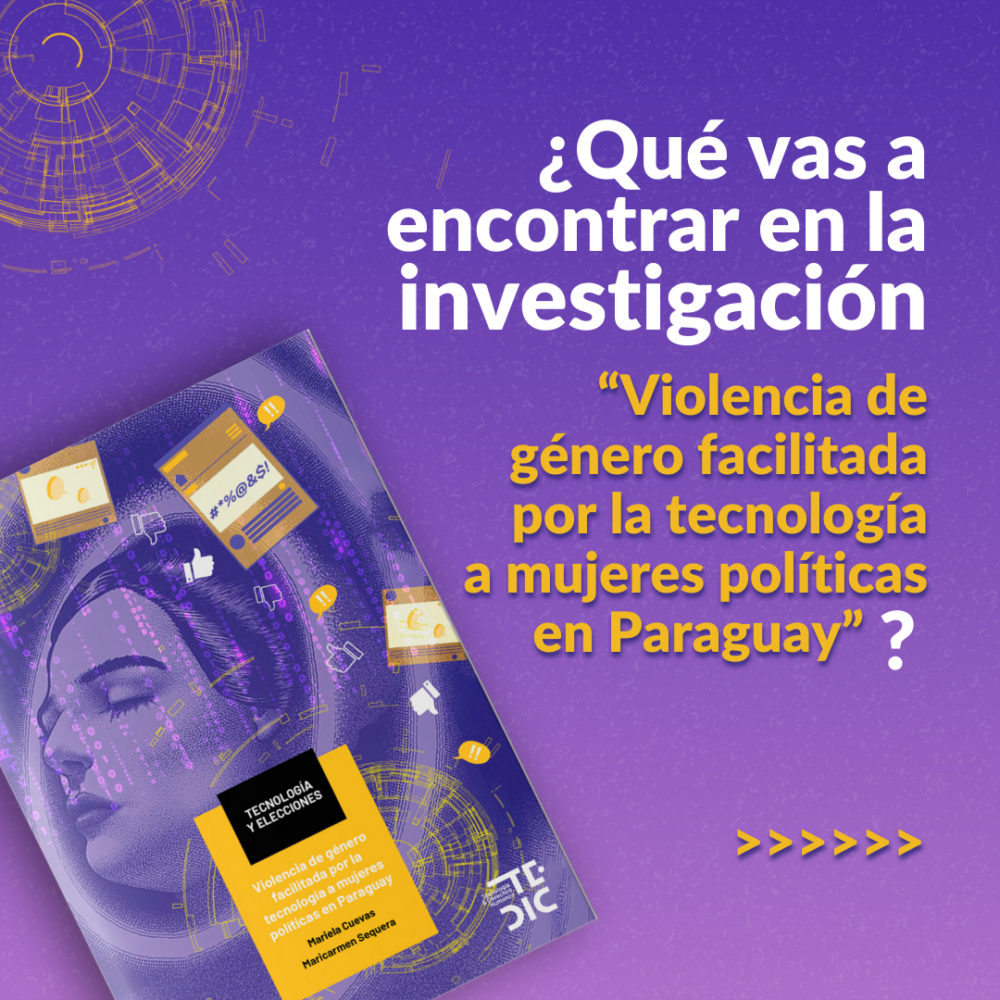
Technology-facilitated gender-based violence (TFGBV) is a reflection of the structural violence faced by women in society. Far from being an isolated phenomenon, it is an extension and intensification of inequalities and forms of violence already present in physical environments. The research “Technology-facilitated gender violence against female politicians in Paraguay” aimed to explore how these forms of violence are amplified in the digital space, particularly towards women in politics. In this context, the dynamics of power, gender and politics intertwine to create a hostile environment that affects both their professional and personal lives.
This study emerged as a response to the scarcity of information and awareness about technology-facilitated gender-based violence in Paraguayan politics. Its primary goal was to conduct an exploratory study that generates evidence, based on empirical data, to address the lack of available information. The research also sought to understand not only the different manifestations of digital violence but also the profiles of the perpetrators and the structures that enable this violence to persist.
By shedding light on these phenomena, this work aims to join the ongoing efforts made by journalists, organizations, and feminist researchers to develop public policies and effective solutions to prevent and mitigate this form of violence in Paraguay. The study recognizes the complexity of the issue and its intersection with other forms of discrimination, such as racism and violence based on sexual orientation.
TFGBV and its diverse manifestations according to context
This research focused on understanding the specific patterns of technology-facilitated gender-based violence against female politicians in the Paraguayan context, influenced directly by local political and social dynamics. Therefore, we conducted interviews and focus groups with female politicians from the Executive, Judicial, and Legislative branches to obtain a diverse representation. We gained insights into how systematic violence faced by women in politics through the use of technology is identified, manifested, mitigated and addressed.
The intersectional approach was key in this research, acknowledging that female politicians in Paraguay face violence not only because of their gender, but also because of their race, class, sexual orientation, and other social markers. This allows for a deeper and more comprehensive understanding of the problem.
Types of violence and their perpetrators
Of the 21 types of digital violence previously identified by TEDIC, this research found that 8 manifested themselves most frequently among Paraguayan women in politics:
- Online harassment: offensive comments related to their image and ability.
- Doxxing:The dissemination of private information without consent.
- Disinformation:The dissemination of rumors and distortion of statements in order to delegitimize women.
- Non-consensual dissemination of intimate images: Exposure of private photos in order to humiliate.
- Coordinated harassment: Organized attacks by groups with political interests.
- Unauthorized monitoring or surveillance: Tracking of their online activities.
- Defamation: Spreading lies that damage their reputation.
- Hate speech: Language that denigrates their identity and political abilities.
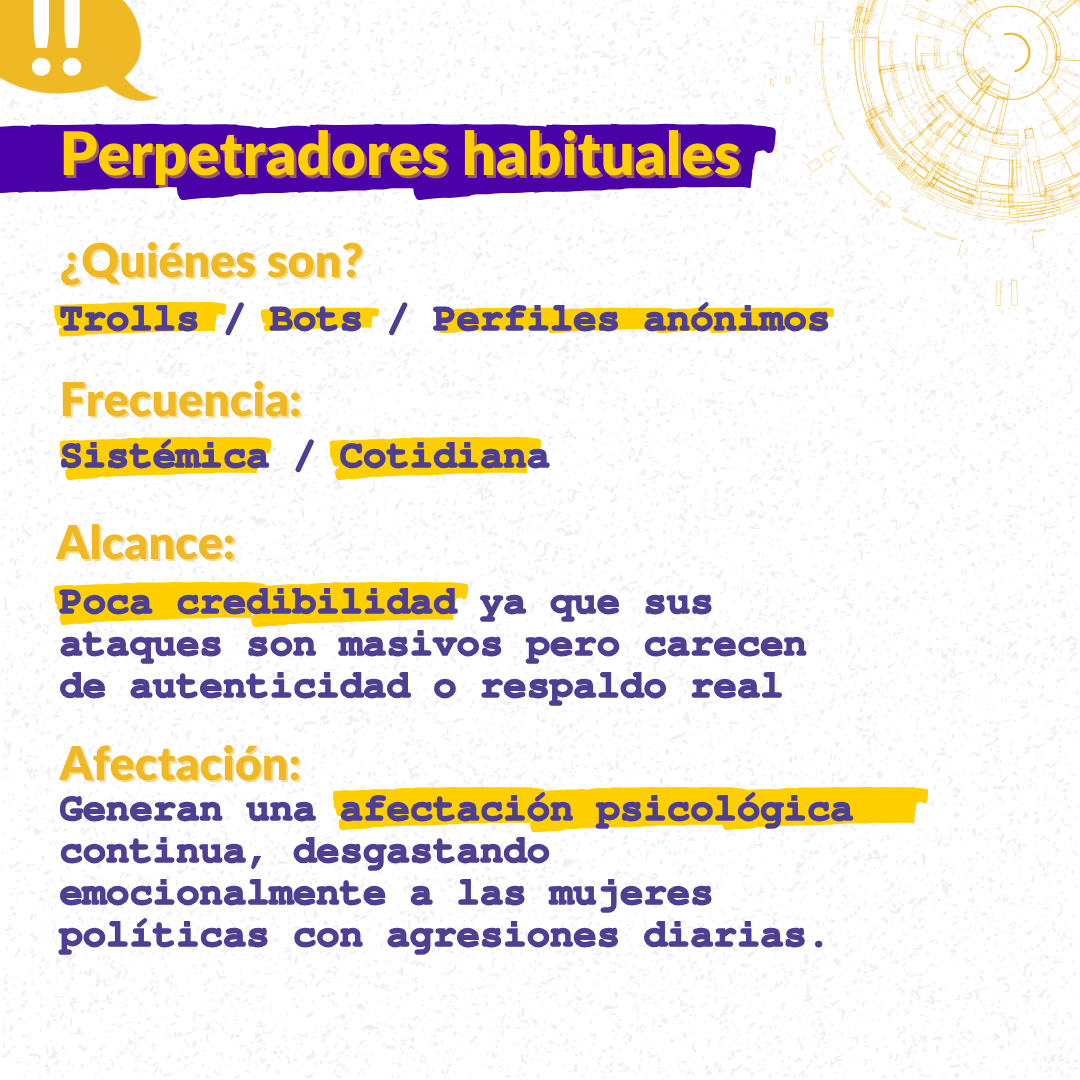
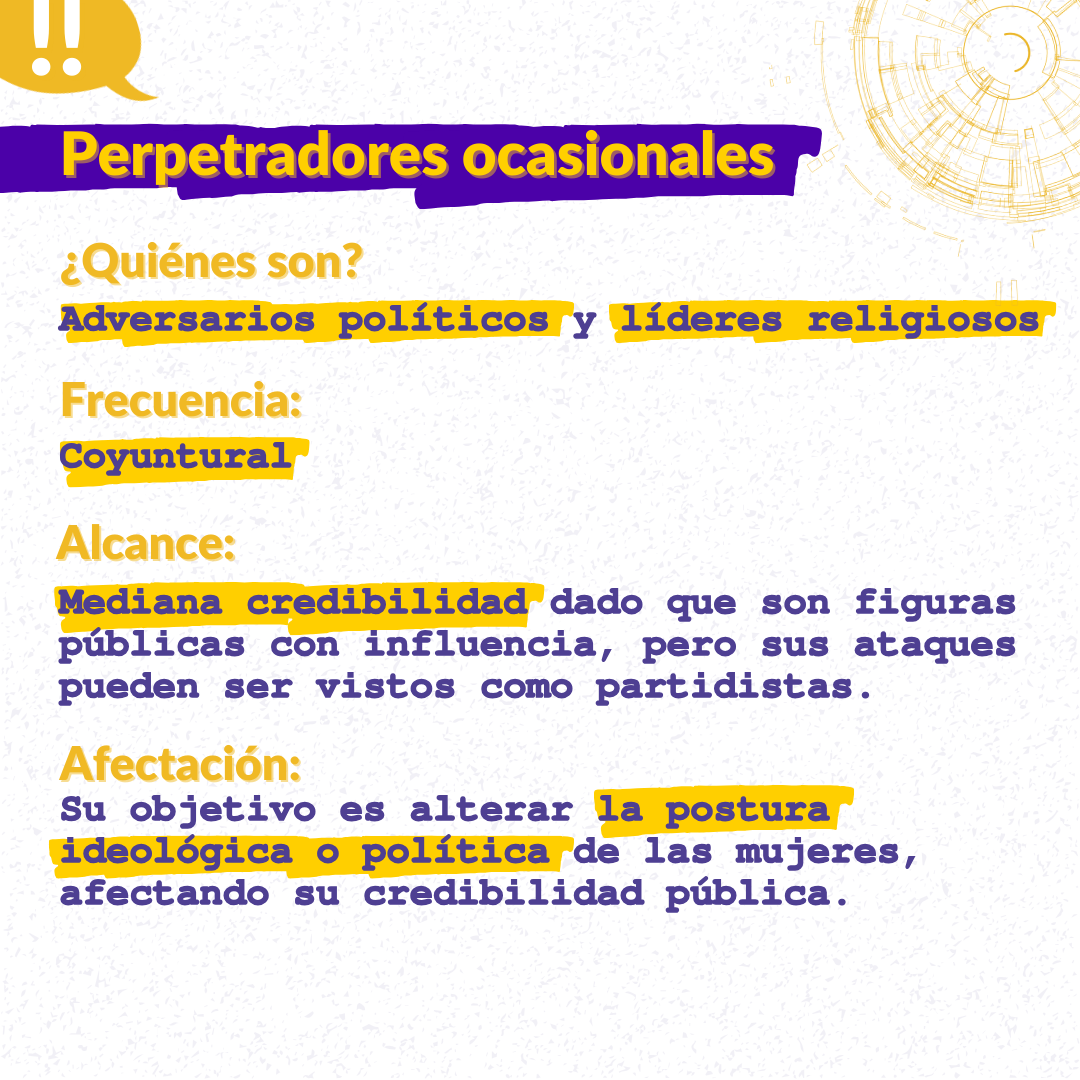
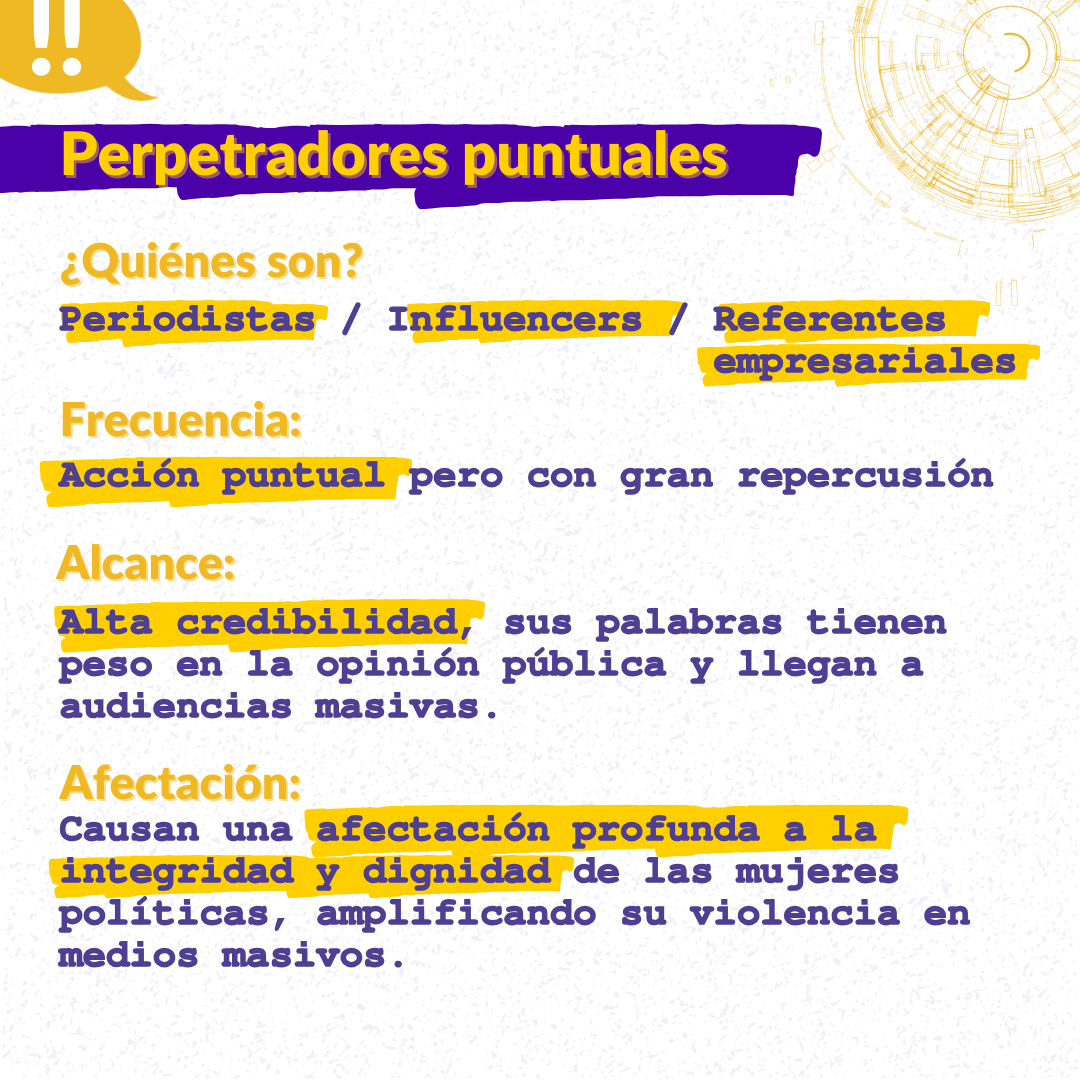
In addition, 12 types of perpetrators were identified, ranging from rival politicians, trolls and bots, media outlets, to anti-rights groups and criminal organizations. In many cases, these perpetrators operate with impunity, and female politicians find themselves without effective institutional mechanisms for protection
Impact of violence: Self-censorship and fear as a consequences
Technology-facilitated gender-based violence has a direct impact on the lives of women in politics. On a psychological level, it causes fear, stress, anxiety and sadness. Many women resort to self-censorship to avoid constant online harassment, which limits their right to freedom of expression and affects their ability to fully engage in political life.
In addition, the escalation of online violence into physical threats is an alarming reality. In some cases, female politicians have had to live on constant alert, fearing for their safety and physical integrity. One of the most notable examples is that of former Senator Kattya González, who received death threats as part of the digital campaigns organized against her, resulting in the loss of her rightfully won seat.
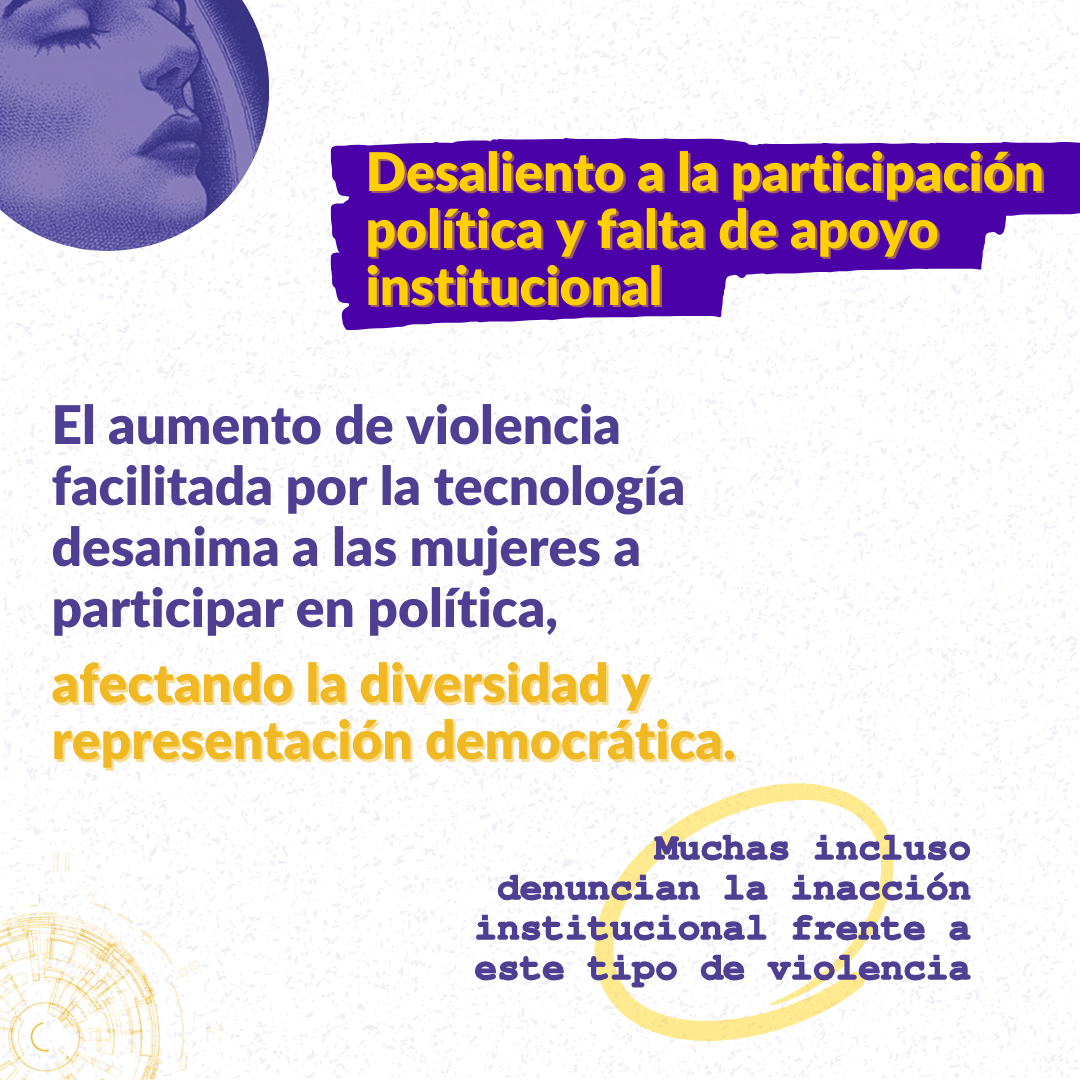
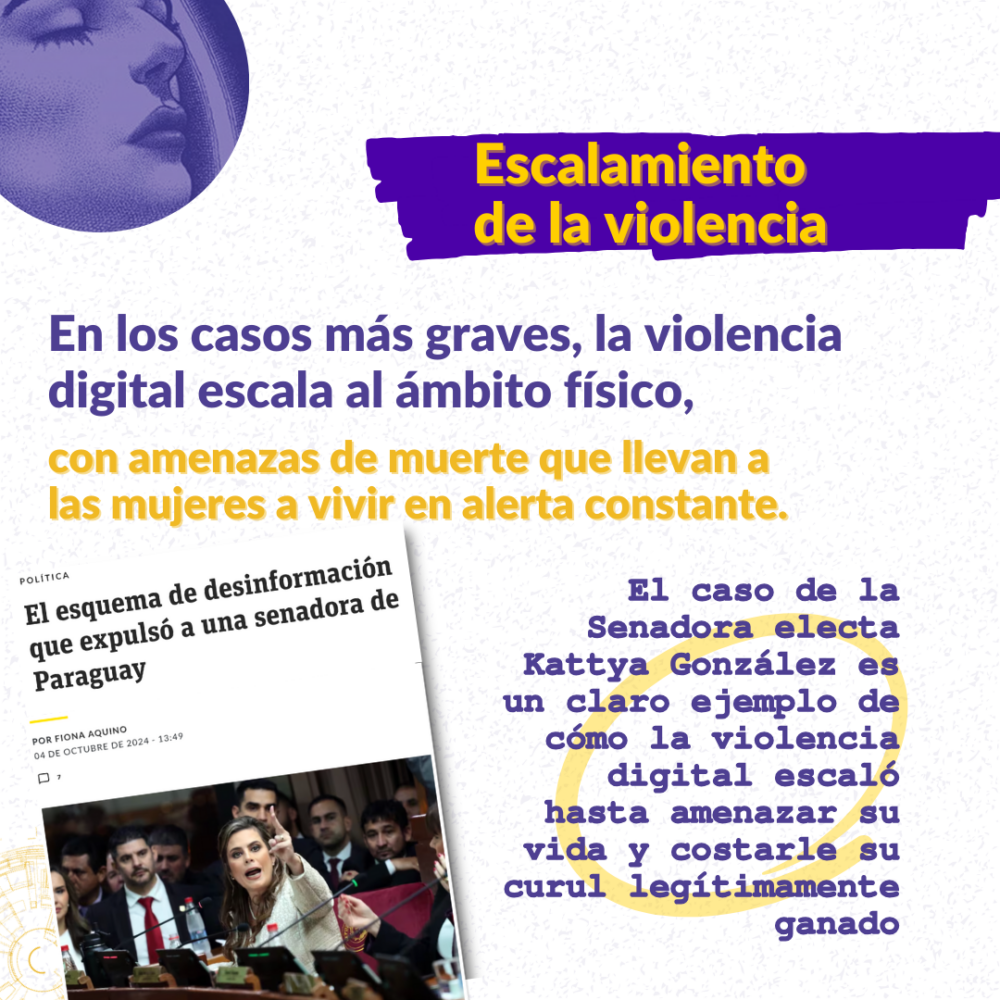
Need for a comprehensive and specific legal framework
Paraguayan women in politics highlight the importance of Law No. 5777/16 against all forms of violence against women, which has established policies and strategies to prevent, punish and address violence against women. This law has been fundamental in defining femicide as a crime and providing care and protection measures in both the public and private spheres. However, despite these advances, the women interviewed pointed out the need to expand and improve its implementation in order to address the specific violence they experience in the political sphere.
In this regard, the interviewees emphasize that while the law provides an important foundation, many women are unaware of its content or lack access to mechanisms to effectively activate its protection. There is an urgent need to create specialized courts that allow a more suitable implementation and that have professionals trained in gender issues and digital violence. Moreover, they indicated that the training of legal professionals remains a challenge, since the interpretation and application of the law often depends on individual criteria, which weakens its effectiveness.
In addition to strengthening Law 5777/16, women politicians identified the need for specific legislation to tackle digital violence directed at them, as this form of violence continues to be dismissed or misunderstood by institutions. Such a law would enable the punishment of perpetrators, strengthen the protection of victims, and establish public policies that focus on digital violence against women in the political sphere.
It is urgent to develop evidence-based policies that not only recognize and protect victims but also address the power dynamics and perpetrators that perpetuate this violence. The lack of institutional responses not only impacts women already in positions of power, but also discourages other women from participating in politics, weakening democracy as a whole.
Finally, the female politicians interviewed suggest that any legislation on digital violence should include a broad dialogue with multiple stakeholders, from digital platforms to the judicial system and civil society. This is essential to ensure that the measures implemented are effective without unduly restricting freedoms of expression.
A call to action
This research calls on all social and political actors in Paraguay to work together to combat technology-facilitated gender-based violence. It is crucial to recognize this form of violence as a real threat to democracy and to implement effective measures to prevent and punish these acts.
It is essential that digital platforms, civil society, and the state work together to ensure a safe environment, both online and offline, so that women can fully exercise their political rights without fear of violence or retaliation.
Learn more about the research by clicking on the download link.



 [Research] Technology-facilitated gender-based violence against women politicians in Paraguay
[Research] Technology-facilitated gender-based violence against women politicians in Paraguay